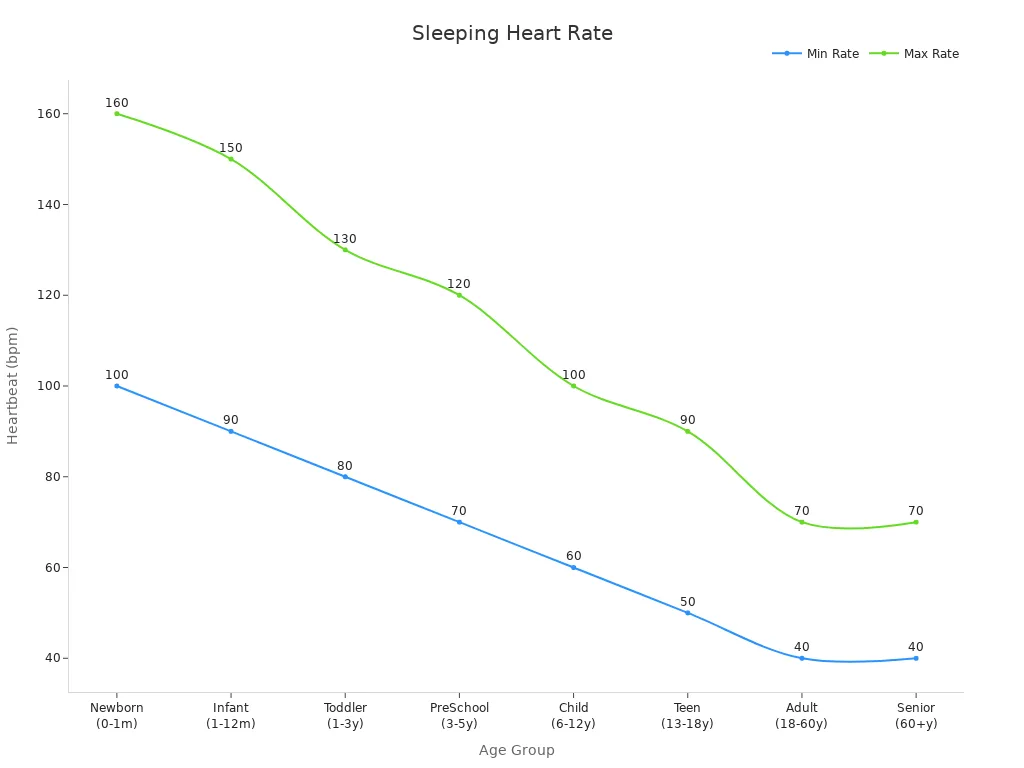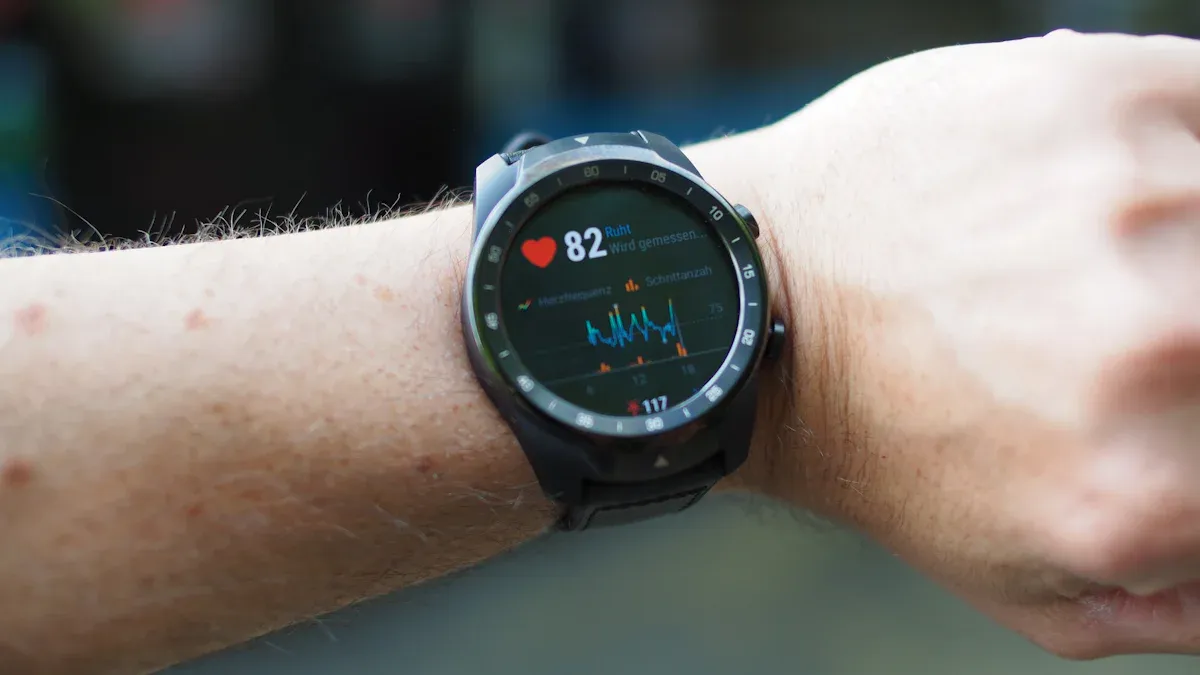
You might wonder what counts as a normal sleeping heart rate for your age. Take a look at this table to see the typical ranges:
|
Age Group |
Typical Sleeping Heart Rate Range (bpm) |
|---|---|
|
Newborns (0–1 month) |
100–160 |
|
Infants (1–12 months) |
90–150 |
|
Toddlers (1–3 years) |
80–130 |
|
Preschoolers (3–5 years) |
70–120 |
|
Children (6–12 years) |
60–100 |
|
Teens (13–18 years) |
50–90 |
|
Adults (18–60 years) |
40–70 |
|
Seniors (60+ years) |
40–70 |

A normal sleeping heart rate usually drops as you get older. For infants and young children, you see higher numbers. As an adult or senior, your normal sleeping heart rate often falls between 40 and 70 bpm during sleep. When you check your sleeping heart rate by age, you notice that sleep helps your heart slow down and recover. A healthy sleeping heart rate supports your body as you rest. If you want to learn about Normal Sleeping Heart Rate by Age: How to Optimize It, keep reading.
Key Takeaways
-
Sleeping heart rate changes with age. Newborns have the fastest heart rates. Adults and seniors have slower heart rates, usually between 40 and 70 bpm. Regular exercise helps your sleeping heart rate stay healthy. Good sleep habits are important too. Managing stress is also helpful for your heart. These things help your heart recover. You can use wearable devices to check your sleeping heart rate. You can also check your pulse by hand. These ways make it easy to track your heart rate while you sleep. They help you notice changes over time. Watch for heart rates that are not normal. Look out for chest pain or dizziness during sleep. Talk to a doctor if you notice these problems. Good sleep quality is important for your heart. Taking care of health problems helps your sleeping heart rate. This is important at any age.
Sleeping Heart Rate by Age
Children
Younger children and infants have higher sleeping heart rates than adults or seniors. Your child’s heart works harder during growth and development, so you see higher numbers, especially in infants. For example, newborns can have a normal sleeping heart rate between 100 and 160 beats per minute (bpm). As your child grows, this number drops. By the time your child reaches school age, the normal sleeping heart rate falls closer to 60–100 bpm.
-
Typical sleeping heart rate by age group:
-
Newborns (0–1 month): 100–160 bpm
-
Infants (1–12 months): 90–150 bpm
-
Toddlers (1–3 years): 80–130 bpm
-
Preschoolers (3–5 years): 70–120 bpm
-
Children (6–12 years): 60–100 bpm
-
Studies show that as children get older, their sleeping heart rate decreases. Researchers found a clear link between age and heart rate, with a steady decline as children grow. Physical activity and body composition also play a role in these changes. Scientists have confirmed these normal sleeping heart rate ranges by studying hundreds of children across different ages. This research helps you understand why your child’s heart rate may seem high compared to your own.
Adults
When you reach adulthood, your sleeping heart rate usually drops. Most healthy adults have a normal sleeping heart rate between 40 and 70 bpm during sleep. Your heart becomes more efficient, pumping blood with less effort. Many adults see their lowest heart rates while sleeping, especially if they are physically fit.
-
Typical sleeping heart rate for adults: 40–70 bpm
Clinical studies using devices like the Oura Ring show that these numbers match what doctors see in medical tests. Most adults have a sleeping heart rate in the mid-50s to mid-60s bpm. A lower resting heart rate often means your heart muscle works well and does not need to beat as fast. If you notice your sleeping heart rate stays below 60 bpm or above 100 bpm for long periods, you should talk to your doctor. Lifestyle choices such as regular exercise, good sleep habits, and stress management help you keep your sleeping heart rate in the normal range.
Seniors
As you get older, your sleeping heart rate may change again. Seniors often have a normal sleeping heart rate between 40 and 70 bpm, similar to adults. However, some seniors may see slightly higher numbers due to changes in the heart and nervous system. Your heart’s ability to respond to signals slows down with age, and heart rate variability (HRV) also decreases.
Research shows that sleep plays a key role in keeping your heart healthy as you age. Scientists found that seniors who get enough sleep tend to have better heart rate variability. This means your heart can still adjust to changes, even as you get older. Monitoring your sleeping heart rate by age helps you spot early signs of heart problems and keep track of your health.
You can see that sleeping heart rate by age follows a pattern: infants and children have the highest rates, adults have lower rates, and seniors may see a slight increase or decrease. Knowing what is normal for your age helps you understand your body and take better care of your heart.
Normal Sleeping Heart Rate: Key Influences
Age and Fitness
Your age and fitness level play a big role in your normal sleeping heart rate. As you grow older, your heart rate during sleep usually drops. Children have higher heart rates because their bodies and hearts work harder as they grow. Adults and seniors often see lower numbers, but this can change if you stay active. People who exercise regularly or play sports often have a lower resting heart rate, even while they sleep. Scientific research shows that a lower resting heart rate means better heart health and higher fitness. Athletes sometimes have a sleeping heart rate below 60 beats per minute without any health problems. If you work on your fitness, you may notice your normal sleeping heart rate gets closer to your target heart rate for good health. Losing weight and managing stress also help your heart work less during sleep.
Health and Medications
Your health and the medicines you take can change your normal sleeping heart rate. Some health conditions and medications affect how your heart works at night.
-
Mood and anxiety disorders, like depression or PTSD, can lower your heart rate variability during sleep.
-
Poor sleep and these conditions can make each other worse.
-
Medicines for these problems may also lower your heart rate variability, making your heart less able to adjust.
-
If you feel stressed or have trouble sleeping, your heart may beat faster or slower than normal.
-
Some sleep problems cause your heart to work harder, which can move your sleeping heart rate away from your target heart rate.
-
Doctors see that people with these health issues often have lower heart rate variability compared to healthy people.
Sleep Quality
Good sleep helps your heart stay healthy. When you get enough rest, your normal sleeping heart rate stays in a healthy range. A study on medical students found that poor sleep quality changes how your heart works at night. Students with more sleep problems had lower heart rate variability, which means their hearts could not adjust as well. This happens because poor sleep affects both the calming and active parts of your nervous system. If you want to keep your normal sleeping heart rate and target heart rate healthy, focus on getting good sleep every night. Better sleep helps your heart recover and keeps your health strong.
Monitor Sleeping Heart Rate

Wearables and Devices
You can track your sleeping heart rate easily with modern wearables. Devices like smartwatches, fitness trackers, and rings measure your heart rate while you sleep. Popular brands such as Fitbit, Oura Ring, and Apple Watch use sensors to collect data all night. Studies show that these devices give accurate heart rate readings during sleep when compared to medical tests like polysomnography and electrocardiography. Some devices may slightly underestimate your heart rate or overestimate how long you sleep, but they still provide reliable information for most people. Many wearables combine heart rate variability and movement data to improve the precision of sleep stage detection. This helps you understand your sleep patterns and how your heart responds during rest.
Note: Most validation studies use gold-standard methods to check the accuracy of these devices. You can trust the results for tracking your sleeping heart rate at home.
Manual Checks
If you do not have a wearable, you can check your heart rate manually. When you wake up from sleep, place two fingers on your wrist or neck and count your pulse for 30 seconds. Double that number to get your beats per minute. Try to check your pulse right after waking up, before you get out of bed. This gives you a good idea of your sleeping heart rate. Manual checks work best if you do them at the same time each morning. You can write down your results in a notebook or use a simple app to track changes over time.
Tracking Tips
To get the most accurate sleeping heart rate readings, follow a few simple tips:
-
Wear your device snugly on your wrist or finger during sleep.
-
Keep your skin clean and dry where the sensor touches.
-
Avoid moving too much while you sleep, as motion can affect the data.
-
Combine heart rate data with movement tracking for better results.
-
Check your sleeping heart rate at the same time each day for consistency.
-
Use your device’s app to review trends and spot changes in your sleep patterns.
You can also calculate your target heart rate for sleep by comparing your awake and sleeping heart rates. Many devices let you see this difference, which helps you understand your heart’s recovery at night. If you want to improve the precision of your measurements, use devices that collect heart rate data every minute and review your results over several nights. This approach gives you a clear picture of your sleep and helps you reach your target heart rate for good health.
Normal Sleeping Heart Rate by Age: How to Optimize It
When to Be Concerned
You should know what heart rate numbers may signal a problem during sleep. For children, a sleeping heart rate above 160 bpm or below 60 bpm can be a concern. Adults and seniors should watch for rates above 100 bpm or below 40 bpm while sleeping. If you notice your heart rate jumps suddenly or stays outside the normal range for your age, pay attention. You may also feel symptoms like palpitations, skipped beats, or a racing heart. Sometimes, you might notice shortness of breath, chest discomfort, or lightheadedness during sleep. Numbness in your hands or feet can also be a warning sign. These symptoms, along with abnormal heart rate readings, mean you should take action.
When to See a Doctor
You should contact your doctor if your sleeping heart rate stays above 100 bpm or drops into the 20s, even if you feel fine. Doctors recommend seeking help if you have symptoms such as chest pain, fainting, or trouble breathing during sleep. If you notice numbness in your fingers or toes, do not ignore it. Your doctor can check for sleep disorders or heart problems. Medical experts say that both the numbers and your symptoms matter. You should not wait if you feel unwell or see big changes in your normal sleeping heart rate by age: how to optimize it.
Heart Health Tips
You can take steps to improve your normal sleeping heart rate by age: how to optimize it. Try these tips to support your heart and sleep:
-
Avoid eating late at night to help your heart rate stay steady during sleep.
-
Plan workouts earlier in the evening, at least one to two hours before bedtime.
-
Limit alcohol before bed to prevent heart rate spikes during sleep.
-
Follow your natural sleep-wake cycle to support your heart’s recovery.
Physical activity, healthy eating, and good sleep habits all help lower your resting heart rate. Wearable devices can track your sleep and heart rate, making it easier to see progress. Research shows that these lifestyle changes improve heart rate and sleep, even if studies do not separate results by age. You can use these tips to keep your normal sleeping heart rate by age: how to optimize it and protect your health.
You now know the healthy sleeping heart rate ranges for children, adults, and seniors. Your sleep patterns change as you age, so tracking your heart rate during sleep helps you spot changes early.
-
Heart rate variability drops as you get older or if you have heart or lung problems.
-
Healthy people show a dip in heart rate during sleep, but this can change with age or illness.
-
Sleep supports your heart’s natural rhythm and recovery.
You should watch for unusual sleep heart rate patterns and talk to your doctor if you notice changes. Everyone’s sleep is unique. Paying attention to your sleep helps you protect your heart and enjoy better health every night. 😊
FAQ
What is the best way to check my sleeping heart rate at home?
You can use a smartwatch or fitness tracker. These devices measure your heart rate while you sleep. If you do not have one, check your pulse right after waking up using your fingers and a timer.
Can stress affect my sleeping heart rate?
Yes, stress can raise your sleeping heart rate. Your body reacts to stress by releasing hormones. These hormones make your heart beat faster, even during sleep. Try deep breathing or relaxation exercises before bed to help lower stress.
Should I worry if my child’s sleeping heart rate seems high?
Children often have higher sleeping heart rates than adults. If your child’s heart rate stays above the normal range for their age or you notice other symptoms, talk to your doctor for advice.
Does exercise help lower my sleeping heart rate?
Regular exercise makes your heart stronger. A strong heart pumps blood more easily, so your sleeping heart rate may go down. Try to stay active most days of the week for the best results.
When should I see a doctor about my sleeping heart rate?
If your sleeping heart rate stays above 100 bpm or drops below 40 bpm, see your doctor. Also, get help if you feel chest pain, dizziness, or trouble breathing during sleep. Your doctor can check for heart or sleep problems.







